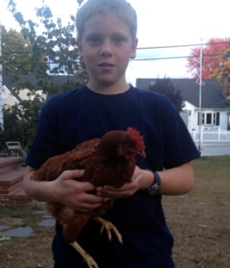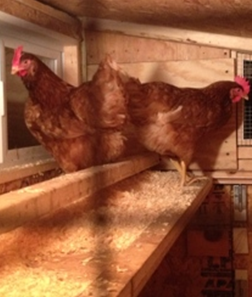 By: Susan Wilson Laplante – November, 2014
By: Susan Wilson Laplante – November, 2014
Yes it’s true, backyard chickens are allowed in Lawrence. The growing rage in urban areas to keep a small flock of chickens in your backyard has made its way to Lawrence. Chickens in the city are nothing new. However, without a permit from the Board of Health, those chickens are illegal and have frequently been confiscated by the Animal Control Officer.
The Lawrence Board of Health regulations that pertain to chickens state:
#28) No person shall keep live fowls of any kind, rabbits, goats, swine or cattle in the city without a permit from the Board of Health.
#29) No person shall keep fowls of any kind in any building which is in use as a dwelling house. And no such permit shall be given except on written application, recommended by an official of the department (health) and approved by the Board of Health.
To obtain a permit send a letter to the Board of Health requesting permission. The permit costs will be $10 per year. The guidelines the city is using mimic those from the city of Somerville. A maximum of 4 hens are allowed and roosters are forbidden.
Many people have strong feelings one way or the other about having chickens. Many concerns are based on misinformation. Here are a few questions that have come up.

Why keep chickens? The decision to keep chickens was to help maintain a healthy lifestyle and a desire to eat quality, healthy foods. I have been researching and (over) analyzing the food industry. What I found that the industrial food complex in the US has done to our food over the last 4 decades is frightening. Factory farmed meats and vegetables are increasingly found to be an unhealthy choice due to genetic modification, pesticide use, added hormones and antibiotics; because of this, growing and raising ones own food is becoming popular.
 What does it cost? The start up costs can be pricy and depend on the amount of space you have and your budget. Coops in all shapes and sizes are available on the internet for any price point. The coop is necessary for the hens to have a comfortable place to sleep and help keep them out of bad weather. In addition to the coop you need a run, a fenced in area for the chickens to have some room to roam about and scratch the ground.
What does it cost? The start up costs can be pricy and depend on the amount of space you have and your budget. Coops in all shapes and sizes are available on the internet for any price point. The coop is necessary for the hens to have a comfortable place to sleep and help keep them out of bad weather. In addition to the coop you need a run, a fenced in area for the chickens to have some room to roam about and scratch the ground.
Supplies needed are; bedding for the coop (we use pine shavings), straw for the nesting boxes, food with an appropriate container and a water dispenser.
You must decide if the cost is worth the benefits. Free-range, organic eggs at the market costs us about $3.69. With our three hens we should get about 900 eggs annually. If we bought all those eggs at the market it would cost us close to $280 per year.
 What about the mess? Using good sanitary practices avoids a mess from building up. Don’t be fooled, those little birds poop a lot! While the regulations call for weekly cleaning, we find that daily cleaning makes clean up easier and prevents odor.
What about the mess? Using good sanitary practices avoids a mess from building up. Don’t be fooled, those little birds poop a lot! While the regulations call for weekly cleaning, we find that daily cleaning makes clean up easier and prevents odor.
Chicken waste is a fantastic fertilizer! The accumulated waste is collected in a covered pail and weekly added to the compost.
The straw for nesting boxes should be changed every two to three weeks to ensure insects do not get in. The straw can be added to the compost or go into the yard waste. Coop bedding (pine shavings) is checked daily for waste and needs to be changed out entirely once or twice a year.
Chickens attract rodents and other predators don’t they? Well lots of things can attract rodents, but yes rodents, raccoons, opossums and hawks do like chickens. Coops and runs should be constructed to eliminate predators’ access. A trench is dug to 12-18” around the perimeter of the coop and run and ½” metal cloth should be buried to prevent animals from digging under. The run should also be covered with the same mesh or other screen to prevent all kinds of birds from getting in.
Don’t chickens pass on diseases? Avian flu is passed via wild birds not domestic chickens. The use of ½” metal cloth to cover the run will keep small birds out thus keeping your chickens healthy. Salmonella is passed along from sick birds usually in large poultry farms. As long as you follow good sanitation practices, you will have healthy chickens and healthy eggs.
Do you have to have a big yard to keep chickens? Chickens only need about 3 square feet per bird. As long as you have space for a coop and appropriate size run you have enough space. You don’t have to allow the chickens to roam around the yard. But if you do, you should ensure your yard is fenced to keep them contained on your property.
What happens to the chickens in the winter? Poultry actually don’t mind the cold, they tolerate it much better than the heat. As long as the bird’s water doesn’t freeze, have shelter from the wind, weather, and predators, they will thrive over the New England winter.
Keeping chickens is fun and healthy, and the right decision for our family. For further information about keeping backyard chickens in Lawrence you should contact the Board of Health in the city’s Inspectional Services Department.
